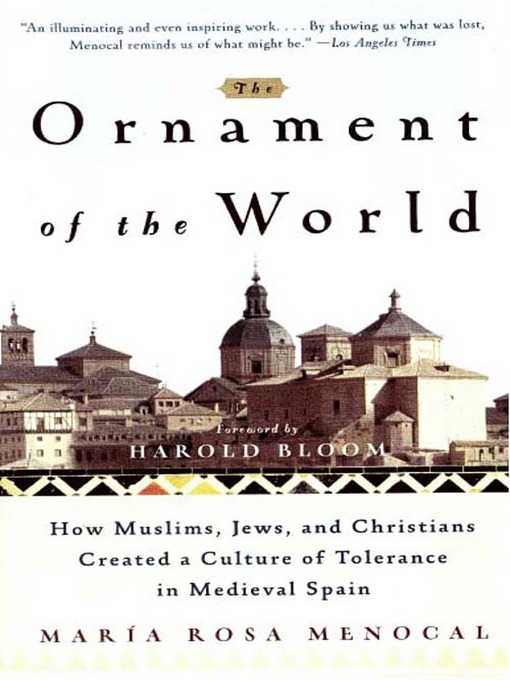The Ornament of the World
How Muslims, Jews, and Christians Created a Culture of Tolerance in Medieval Spain
This enthralling history, widely hailed as a revelation of a "lost" golden age, brings to vivid life the rich and thriving culture of medieval Spain, where for more than seven centuries Muslims, Jews, and Christians lived together in an atmosphere of tolerance, and where literature, science, and the arts flourished.
"It is no exaggeration to say that what we presumptuously call 'Western' culture is owed in large measure to the Andalusian enlightenment...This book partly restores a world we have lost." —Christopher Hitchens, The Nation
-
Creators
-
Publisher
-
Release date
November 29, 2009 -
Formats
-
Kindle Book
- ISBN: 9780316092791
-
OverDrive Read
- ISBN: 9780316092791
-
EPUB ebook
- ISBN: 9780316092791
- File size: 2119 KB
-
-
Languages
- English
-
Reviews
-
Publisher's Weekly
April 29, 2002
In the middle of the eighth century, Abd al-Rahman left his home in Damascus, escaping as the sole survivor of the massacre of his family, the Umayyads, who had first led Muslims into Syria. After five years, the young man settled in a place he called al-Andalus, the Arabic word for Iberia. Al-Rahman built himself a palatial home after the fashion of his childhood residence and established the Muslim capital of the West in al-Andalus. In this splendid historical survey, Menocal, director of the Whitney Center at Yale, narrates the story of Islam's development in the West as well as the tale of how Christianity, Judaism and Islam once flourished side –by side, tolerating one another and borrowing language, art and architecture from each other. Surveying the major Spanish cities of the Middle Ages—Toledo, Córdoba, Seville and others—Menocal demonstrates that despite the intractable differences among these three religions they shared a belief that their contradictions could be productive and positive. In Córdoba, for example, Muslims treated the dhimmi, as Jews and Christians were called, with great respect. They were not forced to convert to Islam, as were pagan peoples, and in return Christians and Jews were prohibited from proselytizing Muslims. Although the glory of this medieval world of religious tolerance could not outlast the Crusades or the Inquisition, Menocal shows that even today, especially in art and architecture, traces of this world remain. Engaging prose and lucid insights provide glimpses into a little-discussed chapter of religious history. -
Library Journal
Starred review from September 15, 2002
Menocal (R. Selden Rose Professor of Spanish and Portuguese and director of Special Programs in the Humanities, Yale Univ.) has previously published The Arabic Role in Medieval Literary History: A Forgotten Heritage, as well as other books on the role of the vernacular in medieval cultures. This book certainly reflects her deep scholarship. Menocal offers persuasive evidence that the Renaissance was strongly foreshadowed by the intellectual climate of Spain in the preceding centuries, starting in 783 with the founding of Andalusia by Abd al-Rahman, an Umayyad from Syria. The culture created was receptive to intellectual pursuits not allowed in the rest of Europe for several centuries, including the creation of impressive libraries and the study and translation of Classical authors. Menocal claims that this environment was largely a result of the tolerance shown by this ruler and his successors toward Christians and Jews and their cultures. Menocal has not given us a history book so much as a demonstration that puritanical cultures of any ilk are detrimental to the development of science, art, and literature. Her arguments are convincing even without the dark background of September 11. Recommended for all libraries.-Clay Williams, Hunter Coll. Lib., New YorkCopyright 2002 Library Journal, LLC Used with permission.
-
Booklist
May 15, 2002
In the eighth century, the Abbasids took control of the Islamic empire from the once-powerful Umayyads. Abd al-Rahman, an Umayyad, fled to Spain and founded al-Andalus. There Jews, Christians, and Muslims lived together in relative peace and equality for centuries. The Andalusian kingdom has been largely ignored by Western and Eastern historians alike, but Menocal argues persuasively that to see the Middle Ages through an Andalusian lens reveals no dark ages among them but instead "a whole series of golden ages." Indeed, from the rediscovery of Hebrew by Jews to translations of Plato and Aristotle, the Andalusians laid the groundwork for the Renaissance. The culture of tolerance slowly fell apart, of course, and has never really returned. Menocal displays a lavish sense of place that should be the envy of many novelists, telling an engaging story in detail without ever alienating the general reader. Her seductively written history serves as both a testament to past tolerance and the hope of a peaceful future. The lessons of Andalusian history surely have never been more timely.(Reprinted with permission of Booklist, copyright 2002, American Library Association.)
-
Loading
Why is availability limited?
×Availability can change throughout the month based on the library's budget. You can still place a hold on the title, and your hold will be automatically filled as soon as the title is available again.
The Kindle Book format for this title is not supported on:
×Read-along ebook
×The OverDrive Read format of this ebook has professional narration that plays while you read in your browser. Learn more here.



